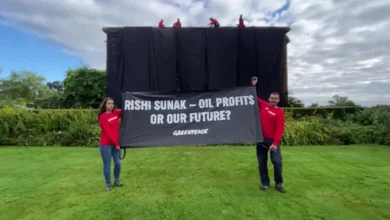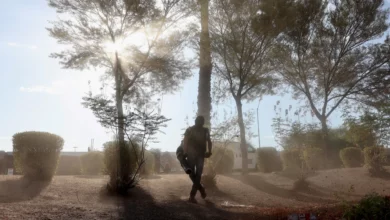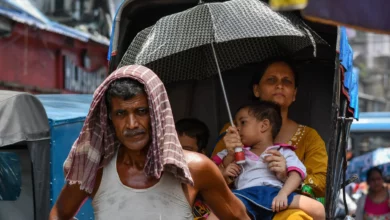The recent COP15 climate talks in Copenhagen were the focus of grassroots activism worldwide, as millions of people mobilized to express their growing concern about the fate of our planet. Egypt, however, was conspicuous in its silence. Even the candlelight vigils organized by online environmental-awareness campaign –held in hundreds of countries–proved bitter disappointments.
“Environmental issues are low on the priority list here,” said Ahmed el-Droubi, 27-year-old environmental activist. “The youth in this country is apathetic, as are the older generations. Everyone’s concerned with earning a living. Nobody thinks about long-term issues, because most people are struggling with immediate problems.”
El-Droubi points out that, in comparison with all the other problems faced by Egyptians, climate change just doesn’t seem to pose much of a threat. “The issue lacks urgency here," he said. "All we think about is whether or not we’ll be able to put food on the table tonight."
"Environmental degradation, which takes decades, seems like a joke to most people," he added. "We’re in a country where living conditions are too bad for people to realistically care about the future.”
Like many others also concerned about the climate, el-Droubi worries about the lack of local initiative. “It’s very difficult to raise awareness here because we’re in a closed loop," he said. "Our education system is terrible due to the economic and political systems which, in turn, benefit from the people’s deterioration and the low quality of education. It’s a very difficult cycle to break.”
Evette Shoukry, a teacher at a Nasr City school, agrees that the educational system is partly to blame. “The system is designed to bring out the worst in students,” she sighs. “They’re taught to look after their own best interests. They are taught materialism and how to consume. There’s no sense of responsibility for the environment.”
Passant Abou Youssef, 27, is a member of Keep Egypt Clean, a local group of volunteers who get together on a semi-regular basis for "clean-up days," in which members–armed with brooms, dust pans, and trash bags–clean the streets of different neighborhoods. Through her experiences with the group, Passant is convinced that people, especially children, are aware of the problem and that they truly want to make a difference.
“Those who show up most consistently at clean-up days are the children,” she said. “They’re the ones who are the most enthusiastic. They’re the ones that, at the end of the day, will be proudly telling us what they’ve learned and how they’ll share it with others. The problem is, once they go home, none of what they’ve learned is enforced or supported.”
“There’s a strong sense of hopelessness that’s really prevalent among today’s youth,” noted Mohamed el-Afifi, 25. Through his work in the socio-economic development field, el-Afifi has traveled all over rural Egypt looking at ways to improve living standards in poverty-stricken villages. Despairingly, el-Afifi claims that the biggest obstacle to his work isn’t the government–or any of the other usual suspects–but rather, the villagers’ own apathy.
“People have lost faith in things getting better; lost faith in the government. Most importantly, they’ve lost faith in themselves," he said. "How can anyone commit to long term goals–like climate change–when they don’t believe they have what it takes to see something like that through?”
El-Afifi remembers one particular incident in Qalyubia. “We were in this village, and there were trash mounds everywhere. Looking around, that’s all you’d see–mountains of trash covering the houses," he recalled. "The villagers’ explanation was that the garbage trucks never came to collect the trash–which is believable. But look at how they were living. Why is it easier to let trash mounds grow around where you live instead of doing something about it?”
“You can blame the government, but people should also be held responsible,” he added. “At the end of the day, disposing of your trash properly and not just dumping it in the street–that isn’t taking the initiative, it’s just good values.”
But it seems these values have become a rare phenomenon. A short walk through any of Cairo’s myriad districts will likely include the all-too-familiar sight of overflowing dumpsters surrounded by trash heaps, and carpets of plastic bags and wrappers around every restaurant and kiosk in sight. The problem may be staring everyone in the face, but–until it actually blocks people’s doorways–chances are that little will actually be done about it.
El-Droubi, though, believes he knows what it takes to motivate people. “There’s a group called the Cairo Cyclers’ Club,” he said. “They encourage people to ride their bikes to work and have got a lot of people to participate. They do it for the environment, but also to help with traffic congestion–a problem everyone living here can relate to."
"Coupling these issues is smart, and it raises awareness by dealing with a problem most people share," he added. "Ideas like this are what we really need to raise awareness in Egypt.”
Al-Masry Al-Youm stopped a young man on the street at random to find out how high of a priority the environment was for him.
“As far as I’m concerned, the first thing I need to think about is how to survive in this country so I can build a future for myself," said Yasser, 25, who hopes to graduate from college this year. “Then I can start worrying about the environment.”




